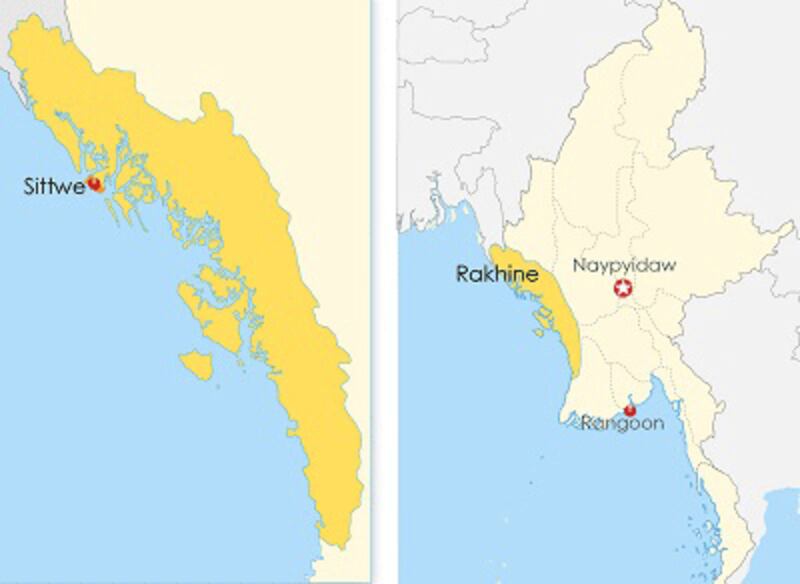Two Myanmar political parties formally objected on Thursday to the government’s newly created Rakhine state advisory commission to examine sectarian tensions between Muslims and ethnic Rakhine Buddhists in the troubled western coastal region where tens of thousands of Rohingya Muslims reside.
The day before, the office of State Counselor Aung San Suu Kyi announced the appointment of former United Nations secretary-general Kofi Annan to chair the nine-member commission, which includes three international representatives, four Buddhist and Muslim members from Myanmar, and two Myanmar government representatives.
But in a letter to the government on Thursday, the Arakan National Party (ANP), which represents the interests of the ethnic Rakhine people in Rakhine state and in the commercial capital Yangon, demanded that the commission be disbanded.
It said it objected to the appointment of three foreigners to the commission, contending that they would not be able to grasp the history and current situation in troubled, ethnically diverse Rakhine state.
“The State Counselor Office’s statement said that the commission will review Myanmar refugees around the world,” said ANP chairman Aye Maung. “Millions of refugees said that they are from Rakhine state and the review is likely to bring them back to the state. It could cause Rakhine people to be concerned about our ethnic sovereignty.”
He also said the ANP would examine whether the commission is being formed in accordance with Myanmar’s constitution which gives only the president authority to create such bodies.
State security issue
The opposition military-backed Union Solidarity Development Party (USDP) also issued a statement on Thursday, noting that the commission's endeavors are to be "humanitarian" in nature and "ignore the state security issue" in Rakhine, according to a report in the online journal The Irrawaddy.
“We still don’t know what the result will be,” said USDP spokesman Khin Ye. “We will watch the commission because we are concerned whether security and national matters could be harmed.”
One Rakhine citizen also objected to the appointment of foreigners to the commission.
“We are not comfortable having foreigners appointed to resolve domestic problems,” Thar Pwint, a resident of Rakhine’s capital Sittwe, told RFA’s Myanmar Service.
To be effective, the commission must adopt a careful and measured approach, said political analyst and commentator Yan Myo Thein.
“To solve the challenges practically, the commission must approach local people carefully and avoid extreme actions,” he told RFA.

A diverse committee
Besides Annan, the two other international members of the commission are Ghassan Salamé, a Lebanese academic and former senior advisor to Annan when he was U.N. secretary-general, and Laetitia van den Assum, a career Dutch diplomat and former advisor to the Joint United Nations Programme on HIV/AIDS.
Win Mra, chairman of Myanmar’s National Human Rights Commission (MNHRC), and Saw Khin Tint, chairwoman of the Rakhine Literature and Culture Association in Yangon and vice chairwoman of the Rakhine Women’s Association, are the commission’s two Buddhist ethnic Rakhine members.
Aye Lwin, a Muslim leader and founder of the interfaith group Religions for Peace Myanmar, and Khin Maung Lay, an MNHRC member, will be serving on the commission as Muslim representatives.
Thar Hla Shwe, president of the Myanmar Red Cross Society and Mya Thida, president of the Obstetrical and Gynecological Society of the Myanmar Medical Association and member of the Myanmar Academy of Medical Science, are the two government representatives.
Future of the Rohingya
At issue for the committee will be the future of Rakhine’s stateless, Muslim Rohingya ethnic minority.
The Myanmar government and the country’s Buddhist majority call the Rohingya “Bengalis” because they consider them to be illegal immigrants from neighboring Bangladesh, and deny them basic rights, freedom of movement, and access to social services and education.
Communal violence between Buddhists and Muslims four years ago displaced 140,000 Rohingya in Rakhine, where the majority of them lives, and left more than 200 dead and tens of thousands homeless.
The Rohingya, who bore the brunt of the attacks, were later forced to live in refugee camps, where about 120,000 remain today.
Aye Lwin said the commission will benefit from having members from different religions, and in foreigners members, in discussing the matter.
“I believe that we will have more justice than before because the people who will lead the commission are impartial and third-party intervenors,” he said. “They are of different nationalities and religions, [including] Christians. They have diplomatic skills and are well-experienced.”
Neutral individuals?
Though an announcement issued on Wednesday by Aung San Suu Kyi’s office said the nine commission members selected were “highly experienced, respected, and neutral individuals,” there are past indications that not all of them may be impartial, and that the Rohingya will continue to face a hard slog of it in Rakhine.
In a June 27, 2012, speech at Aloetawpyi monastery in Rakhine’s Rathedaung township, commission member Saw Khin Tint referred to the Rohingya as “Bengalis,” charging that they are “invaders” who have received support from the “Muslim Circle” and have lied about their history in Rakhine state.
She also contended that Western countries have bought into the image that the Rohingya are destitute and deprived of human rights in Myanmar.
“Although we [ethnic Rakhine people] have been pointing out the truth to the world, in return we’ve been misunderstood,” she told RFA on Wednesday. “We hope we can get more understanding from the world when Kofi Annan, who is an impartial person, sees the real situation and truth in Rakhine state.”
The Myanmar government will sign a memorandum of understanding with the Kofi Annan Foundation in September so that the commission can begin its work.
Reported by Thiha Tun and Thinn Thiri for RFA’s Myanmar Service. Translated by Khet Mar. Written in English by Roseanne Gerin.
